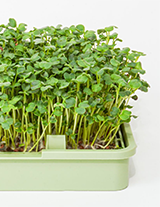
The energy in the seed is stored as protein, fat and carbohydrates. In chia, sunflower and sesame seeds for example, fat is the dominant nutrient and makes up to half of the seed's content.
However, vegetables seeds such as peas, lentils and beans have only about 1% fat. Instead, they contain more carbohydrates, as do cereal seeds such as quinoa and buckwheat.
Carbohydrates
Sprouts and microplants are a rich source of carbohydrates, especially quinoa and buckwheat.
Carbohydrates break down into simple sugars, which in turn are rapidly absorbed into the bloodstream; you would think, therefore, that this would induce an increased blood glucose response - (high GI - glycaemic index). However, studies have shown the opposite: that in fact the blood glucose response is better, i.e. it produces a lower GI. The reason for this is probably due to the increase in phenolic compounds and soluble fibre that occurs during sprouting.
Carbohydrates are one of the main sources of energy for the human body. During the germination process, seeds begin to break down complex carbohydrates into simpler sugars, such as glucose and fructose, to provide the energy needed for plant growth.
Sprouts and microplants contain a variety of carbohydrates:
- Starch: Sprouts contain starch, which is a complex carbohydrate made up of glucose molecules linked together. During sprouting, amylase is released, which helps break down starch into glucose, making it easier for the body to absorb.
- Simple sugars: Germs also contain simple sugars such as glucose and fructose. These are easier to digest and absorb than complex carbohydrates and can be used quickly by the body as a source of energy.
- Fibre: Sprouts also contain fibre, which is a complex carbohydrate that cannot be digested by the body. Fibre plays an important role in maintaining gut health and can help maintain blood sugar levels.
In general, sprouts and microplants are an excellent source of healthy carbohydrates, which can help provide energy and maintain digestive health.
Protein
The protein content of seeds is usually between 10% and 25%, with legume seeds topping the list. During sprouting, the total number of calories decreases, as the process of course requires a lot of energy.
Protein is one of the three essential macronutrients for the human body. Proteins are made up of amino acids and play an important role in building and repairing tissues in the body, as well as producing hormones, enzymes and other important molecules.
Sprouts and microplants contain a variety of proteins, but their quantity and quality depends on the type of sprout. In general, sprouts are a good source of complete protein, i.e. they contain all nine essential amino acids that the body needs. Among the proteins that can be found in plant sprouts are:
- Globulins: - water-soluble proteins found in many seeds and plants. They are rich in essential amino acids and play an important role in maintaining a healthy immune system.
- Albumins: - water-soluble proteins found in seeds and plants. They are rich in amino acids and can be easily digested and absorbed by the body.
- Prolamins: - proteins found in cereals such as wheat, oats and barley. They are rich in amino acids and are important for maintaining a healthy nervous system.
- Glutelins: - proteins found in cereals such as rice. They are rich in amino acids and can help maintain intestinal health.
Sprouts are a good source of quality protein, they help maintain health and normal body function.
Healthy fats
It is important to note that not all fats are equally healthy. For example, trans fats and some saturated fats, such as those found in processed foods, should be consumed in moderation or even avoided in favour of healthier sources of fat, such as those from sprouts and microgreens.
Sprouts and microplants are good sources of healthy fats such as unsaturated and polyunsaturated fatty acids. These include, in particular:
- Omega-3 fatty acids: Sprouts and microplants are a good source of omega-3 fatty acids, especially alpha-linolenic acid (ALA), which is a precursor to eicosapentaenoic acid (EPA) and docosahexaenoic acid (DHA). These fatty acids are essential for maintaining brain and heart health and reducing inflammation in the body.
- Omega-6 fatty acids: Sprouts and microplants also contain omega-6 fatty acids, such as linoleic acid, which play an important role in maintaining healthy skin and hair and regulating inflammation.
- Monounsaturated fats: Sprouts and microplants also contain monounsaturated fats, such as oleic acid, which is found, for example, in olive oil. These fats help maintain heart health and reduce the risk of cardiovascular disease.
- Saturated fats: In smaller amounts, sprouts and microplants may also contain saturated fats. However, excessive consumption of saturated fats may increase the risk of cardiovascular disease.
The fat content of sprouted seeds gradually decreases with sprouting time, the sooner you harvest, the more healthy fat you have per quantity harvested. For example, sunflower seeds have twice as much healthy fat in the form of sprouts than sunflower microplants.
For more information about vitamins, fibres and minerals in microplants, please read "Sprouts, about vitamins" and "Sprouts, about minerals and fibres".

 Microgreens
Microgreens





